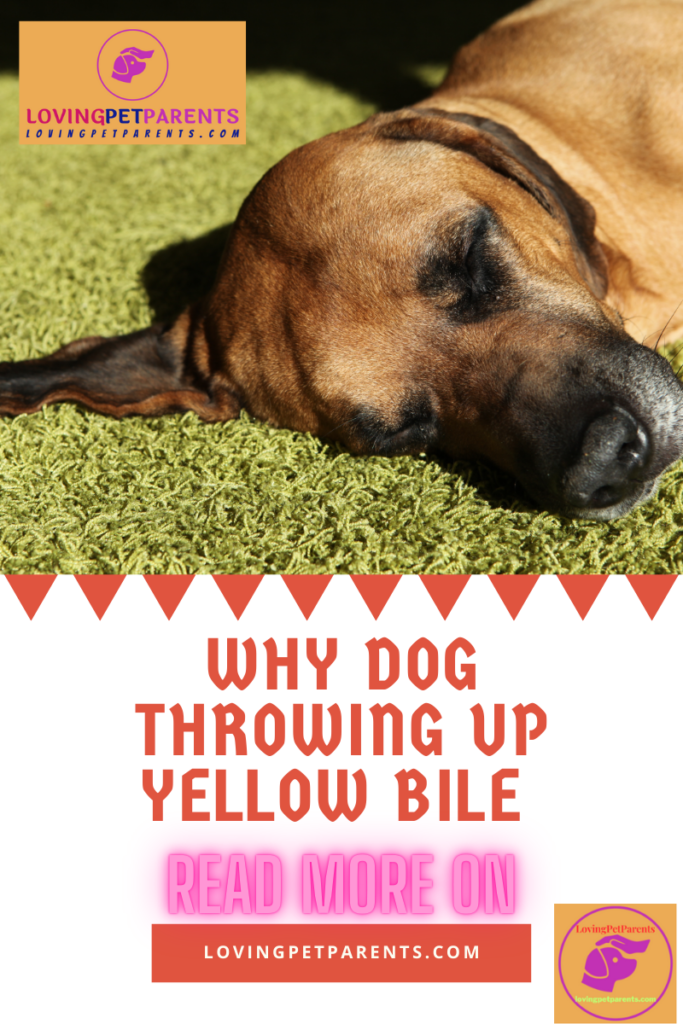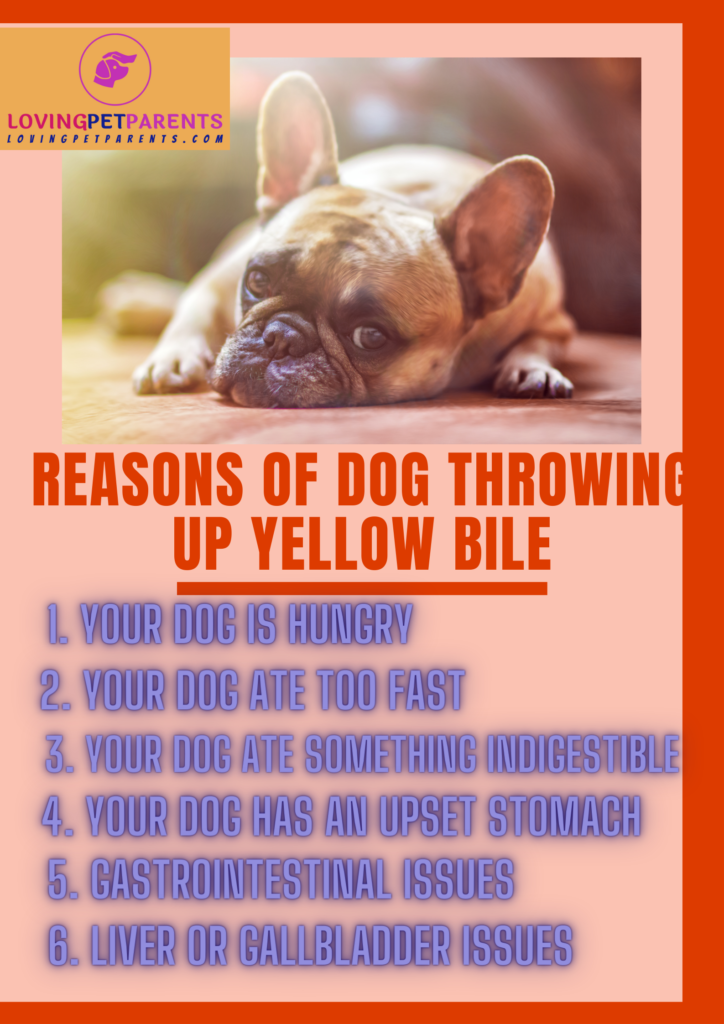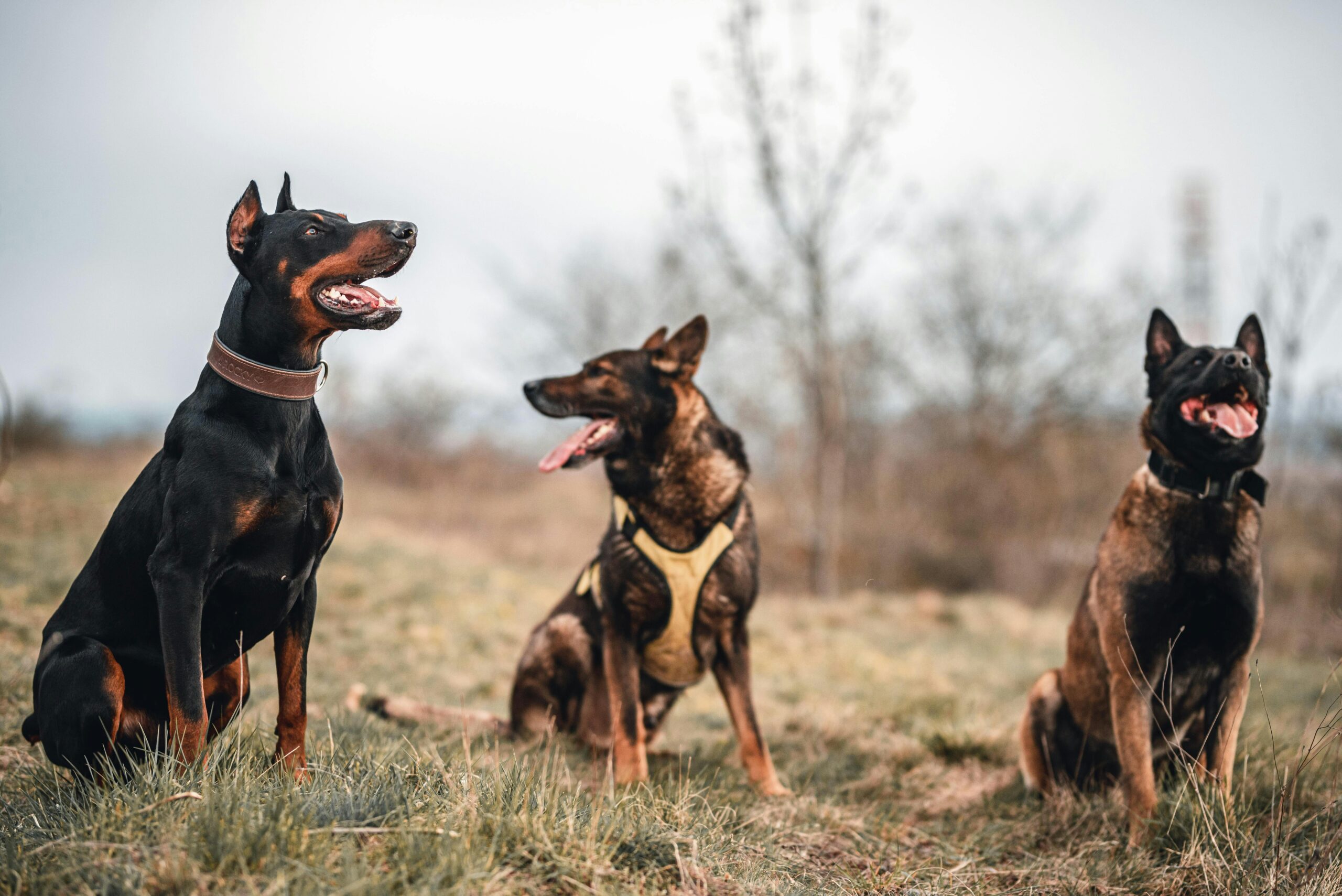At some point, you may have seen your dog vomit yellow bile, which can be a concerning and unpleasant experience. While it’s normal for dogs to vomit occasionally, frequent vomiting, especially with yellow bile, could be a sign of an underlying health issue.

Dogs can be a wonderful addition to any household. They are loyal, loving, and always there to make you smile. However, like humans, dogs can get sick too. One common problem that dog owners face is when their dog is throwing up yellow bile. This can be concerning for many pet owners, and it’s important to understand what may be causing this and what you can do about it.
Introduction
Dogs are susceptible to various health issues, including vomiting. Vomiting is a common problem in dogs and can be caused by a variety of factors, including dietary indiscretion, infection, and underlying medical conditions. Yellow bile vomit is a particular concern for many pet owners, as it can indicate a more severe problem.
In this article, we will discuss why your dog may be throwing up yellow bile and what you should do if you notice this happening.
What is Yellow Bile?
Bile is a digestive fluid that is produced in the liver and stored in the gallbladder. It is essential for the breakdown and absorption of fats in the small intestine. When food enters the small intestine, the gallbladder releases bile into the intestine to help digest fats.
Yellow bile is bile that has been sitting in the stomach for a while. When a dog vomits, the contents of the stomach are forcefully expelled. If the stomach is empty, the bile that has been sitting in the stomach will be expelled, resulting in yellow bile vomit.
Why Is My Dog Throwing Up Yellow Bile and What Should I Do?

There are several reasons why your dog may be throwing up yellow bile:
1. Your Dog is Hungry
One of the most common reasons why dogs vomit yellow bile is because they are hungry. When a dog’s stomach is empty, bile can accumulate in the stomach, which can lead to vomiting. If your dog vomits yellow bile in the morning, before they have had breakfast, this may be the cause.
What You Should Do: To prevent your dog from vomiting due to hunger, try feeding them a small meal before bedtime or offering them a small snack first thing in the morning.
2. Your Dog Ate Too Fast
Dogs that eat too fast can also vomit yellow bile. When a dog eats too fast, they can swallow a lot of air, which can cause their stomach to become distended. This can also lead to vomiting.
What You Should Do: To prevent your dog from eating too fast, try feeding them smaller, more frequent meals or use a slow feeder bowl to slow down their eating.
3. Your Dog Ate Something Indigestible
Dogs have a habit of eating things they shouldn’t. If your dog has eaten something indigestible, such as a toy or a piece of clothing, this can cause vomiting. The presence of this foreign object in the stomach can irritate the stomach lining and cause vomiting.
What You Should Do: If you suspect that your dog has eaten something they shouldn’t have, take them to the vet immediately. The vet may need to perform surgery to remove the object from your dog’s stomach.
4. Your Dog Has an Upset Stomach
If your dog has an upset stomach, they may vomit yellow bile. This can be caused by a variety of factors, including stress, anxiety, or a change in diet.
What You Should Do: To help your dog with an upset stomach, try feeding them a bland diet of boiled chicken and rice. You can also give them a probiotic supplement to help restore their gut flora.
5. Your Dog Has Gastrointestinal Issues
In some cases, vomiting of yellow bile can be a sign of gastrointestinal issues such as gastritis, inflammatory bowel disease, or pancreatitis. These conditions can cause inflammation in the stomach and intestine, leading to vomiting.
What You Should Do: If your dog is vomiting yellow bile frequently or exhibits other symptoms such as diarrhea, lethargy, or loss of appetite, take them to the vet for a check-up. The vet may perform blood tests, x-rays, or ultrasound to diagnose the underlying cause.
6. Your Dog Has Liver or Gallbladder Issues
Yellow bile vomit can also be a sign of liver or gallbladder issues. These organs play a crucial role in the production and storage of bile. If they are not functioning correctly, bile can accumulate in the stomach, leading to vomiting.
What You Should Do: If your dog is vomiting yellow bile frequently or exhibits other symptoms such as yellowing of the skin or eyes, take them to the vet for a check-up. The vet may perform blood tests, x-rays, or ultrasound to diagnose the underlying cause.
How to Help Your Dog
If your dog is throwing up yellow bile, there are some things you can do to help them:
1. Offer Small, Frequent Meals
If your dog is vomiting due to hunger or eating too fast, offer them small, frequent meals throughout the day.
2. Use a Slow Feeder Bowl
If your dog eats too fast, use a slow feeder bowl to slow down their eating.
3. Change Their Diet
If your dog has an upset stomach, try feeding them a bland diet of boiled chicken and rice.
4. Provide Access to Fresh Water
Make sure your dog has access to fresh water at all times.
5. Monitor Their Symptoms
If your dog is vomiting yellow bile frequently or exhibits other symptoms such as diarrhea, lethargy, or loss of appetite, take them to the vet for a check-up.
Frequently Asked Questions
Can stress cause a dog to vomit yellow bile?
Yes, stress and anxiety can cause dogs to vomit yellow bile.
Should I withhold food and water if my dog is vomiting yellow bile?
No, it is essential to keep your dog hydrated and offer them small, frequent meals.
Can I give my dog over-the-counter medication for vomiting?
No, you should never give your dog over-the-counter medication without consulting a vet.
Can a change in diet cause a dog to vomit yellow bile?
Yes, a sudden change in diet can cause gastrointestinal upset and vomiting.
Should I feed my dog after vomiting yellow bile?
If your dog has just vomited yellow bile, it’s generally recommended to wait a little while before feeding them again. This will give their stomach time to settle down and recover.
After a few hours, you can offer your dog a small meal of their regular food. Make sure to feed them slowly and in small amounts, as a sudden increase in food can cause vomiting again.
It’s also important to ensure that your dog is properly hydrated, as vomiting can cause dehydration. Make sure they have access to plenty of clean water and offer them small amounts throughout the day.
If your dog continues to vomit or shows signs of other symptoms such as lethargy, loss of appetite, or diarrhea, it’s best to consult with a veterinarian. They can examine your dog and provide you with expert guidance on how to care for them and ensure their health and well-being.
What can I give my dog for vomiting yellow bile?
If your dog has vomited yellow bile, there are a few things you can do to help settle their stomach:
Water: Make sure your dog has access to plenty of clean water to prevent dehydration.
Fasting: In most cases, it’s recommended to fast your dog for 12-24 hours after vomiting. This gives their stomach time to rest and recover.
Bland Diet: After fasting, you can gradually reintroduce food to your dog with a bland diet. This typically includes boiled chicken or lean ground beef mixed with plain white rice. Feed your dog small portions of this bland diet several times throughout the day.
Over-the-counter medications: There are some over-the-counter medications that can help reduce vomiting in dogs, such as Pepcid AC (famotidine) or Tagamet (cimetidine). However, it’s important to consult with a veterinarian before giving your dog any medication.
It’s important to note that if your dog continues to vomit or shows signs of other symptoms such as lethargy, loss of appetite, or diarrhea, it’s best to consult with a veterinarian. They can examine your dog and provide you with expert guidance on how to care for them and ensure their health and well-being.
Is yellow dog vomit serious?
Yellow dog vomit can be a sign of a few different things, and whether or not it’s serious depends on the underlying cause.
In many cases, yellow dog vomit is simply due to an empty stomach. Dogs who go too long without eating can develop bile reflux, which can cause them to vomit a yellowish liquid. This is generally not a cause for concern and can be resolved by feeding your dog smaller, more frequent meals.
What should I do if my dog is vomiting yellow bile frequently?
If your dog is vomiting yellow bile frequently or exhibits other symptoms such as diarrhea, lethargy, or loss of appetite, take them to the vet for a check-up.
Can liver or gallbladder issues cause a dog to vomit yellow bile?
Yes, liver or gallbladder issues can cause dogs to vomit yellow bile.
Conclusion
Yellow bile vomit can be concerning for many pet owners, but it is often not a cause for alarm. However, if your dog is vomiting yellow bile frequently or exhibits other symptoms, it is essential to take them to the vet for a check-up. By understanding the underlying cause of your dog’s vomiting, you can take steps to help them feel better and prevent future episodes.
Remember to offer your dog small, frequent meals, use a slow feeder bowl, and monitor their symptoms closely. With the proper care and attention, your dog can quickly recover from vomiting yellow bile and return to their happy, healthy self.
If you’re ever in doubt or concerned about your dog’s health, it’s always best to consult with a veterinarian. They can provide you with expert guidance on how to best care for your furry friend and ensure their well-being.
Remember, prevention is always better than cure, so it’s essential to maintain your dog’s health with regular check-ups, a balanced diet, and exercise.
We hope this article has helped answer your questions about why your dog may be throwing up yellow bile and what you can do to help. Always keep an eye on your dog’s health and well-being, and they will reward you with endless love and loyalty for years to come.
Thank you for visiting Loving Pet Parents! We’re passionate about providing helpful information and resources to pet owners. If you’ve enjoyed reading our articles, we invite you to explore more of our content on our website. You’ll find a wealth of information on pet care, behavior, nutrition, and much more. Plus, we’re always adding new articles and resources to help you give your furry friend the best possible care. So why not bookmark our website and check back regularly for new content? We appreciate your support and look forward to sharing more valuable insights with you!
100+ Fun and Creative Names for Calico Cats with meaning
Are Calico Cats Always Female? The Surprising Truth Revealed
Betta Fish Fin Rot: Symptoms, Causes, Prevention & Treatment
How to Trim Dog Nails That Are Overgrown: 6 Easy Steps
The Mighty German Shepherd: A Guide to Owning and Understanding a Loyal and Intelligent Breed
Avoid these 5 pet care mistakes at all costs in the summer season
15 DOG BREEDS LIKE THE PIT BULL TERRIER: FEARLESS, MUSCULAR AND POWERFUL
How to Keep Livebearers: A Comprehensive Guide
We hope you’ve found our articles informative and helpful in caring for your furry companion. If you think our content could benefit other pet owners, we would greatly appreciate it if you shared it with your friends and family. By sharing our articles, you’ll be helping to spread valuable information that can improve the lives of pets and their owners. You can share our articles on social media, through email, or by simply telling others about our website. We thank you for your support and for helping us reach even more pet lovers with our content.





